| Alsodryas | |
|---|---|
| Scientific classification | |
| Domain: | Eukaryota |
| Kingdom: | Animalia |
| Phylum: | Arthropoda |
| Class: | Insecta |
| Order: | Lepidoptera |
| Family: | Gelechiidae |
| Genus: | Alsodryas Meyrick, 1914 |
Alsodryas is a genus of moths in the family Gelechiidae. [1]
| Alsodryas | |
|---|---|
| Scientific classification | |
| Domain: | Eukaryota |
| Kingdom: | Animalia |
| Phylum: | Arthropoda |
| Class: | Insecta |
| Order: | Lepidoptera |
| Family: | Gelechiidae |
| Genus: | Alsodryas Meyrick, 1914 |
Alsodryas is a genus of moths in the family Gelechiidae. [1]
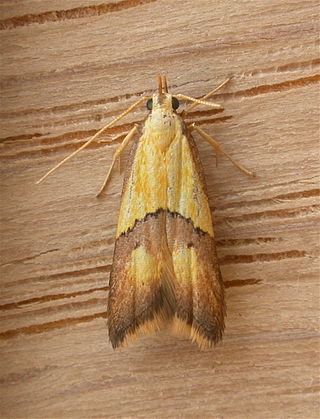
The Lecithoceridae, or long-horned moths, are a family of small moths described by Simon Le Marchand in 1947. Although lecithocerids are found throughout the world, the great majority are found in the Indomalayan realm and the southern part of the Palaearctic realm.

Crambinae is a large subfamily of the lepidopteran family Crambidae, the crambid snout moths. It currently includes over 1,800 species worldwide. The larvae are root feeders or stem borers, mostly on grasses. A few species are pests of sod grasses, maize, sugar cane, rice, and other Poaceae. The monophyly of this group is supported by the structure of the tympanal organs and the phallus attached medially to the juxta, as well as genetic analyses.

Anacampsis is a worldwide genus of moth with most found in the nearctic and neotropical regions. It is in the family Gelechiidae. The larvae feed on a range of deciduous trees and shrubs in a rolled or folded leaf, or spun shoot.
Compsolechia is a genus of moths in the family Gelechiidae.

Dichomeris is a genus of moths in the family Gelechiidae erected by Jacob Hübner in 1818.
Helcystogramma is a genus of moths in the family Gelechiidae. The genus was erected by Philipp Christoph Zeller in 1877.
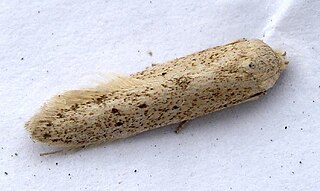
Blastobasis is the type genus of the gelechioid moth family Blastobasidae; in some arrangements these are placed in the case-bearer family (Coleophoridae) as a subfamily. Within the Blastobasidae, the subfamily Blastobasinae has been established to distinguish the Blastobasis lineage from the group around Holcocera, but the delimitation is not yet well-resolved.
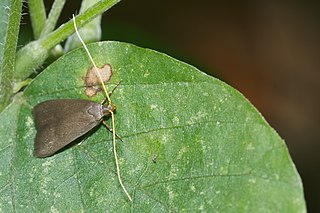
The Lecithocerinae are a subfamily of small moths in the family Lecithoceridae. They are found worldwide, but most species occur in South Asia. The subfamily is characterized by the male genitalia with a bridge-like structure connecting the tegumen and the valva, and the uncus almost always is vestigial with two lobes at the dorsal base, only exceptionally united into a broad plate, but never as a thorn or spine.

Scoparia is a grass moth genus of subfamily Scopariinae. Some authors have assigned the synonymous taxon Sineudonia to the snout moth family (Pyralidae), where all grass moths were once also included, but this seems to be in error.

Lecithocera is a genus of moths in the lecithocerid subfamily Lecithocerinae. The genus was erected by Gottlieb August Wilhelm Herrich-Schäffer in 1853.

Anatrachyntis is a genus of moths in the family Cosmopterigidae. Some authors include it in Pyroderces.

Cosmopterix is a large genus of moth in the family Cosmopterigidae.

Labdia is a genus of moths in the family Cosmopterigidae.

Caloptilia is a genus of moths in the family Gracillariidae.
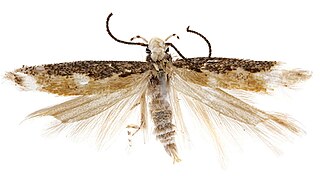
Gelechiinae is a subfamily of moths in the family Gelechiidae. It was described by Henry Tibbats Stainton in 1854.
Alsodryas deltochlora is a species of moth in the family Gelechiidae. It was described by Edward Meyrick in 1922. It is found in Brazil.
Alsodryas lactaria is a species of moth in the family Gelechiidae. It was described by Edward Meyrick in 1914. It is found in Guyana.
Alsodryas prasinoptila is a species of moth in the family Gelechiidae. It was described by Edward Meyrick in 1922. It is found in Brazil.

Anomologinae is a subfamily of moths in the family Gelechiidae.
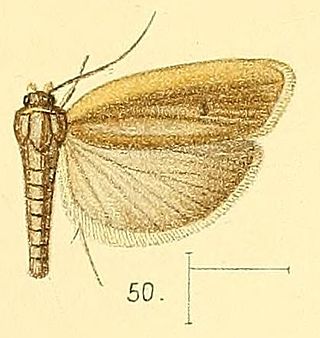
Stenoma is a genus of moths. The type species is Stenoma litura, which was described by Philipp Christoph Zeller in 1839.